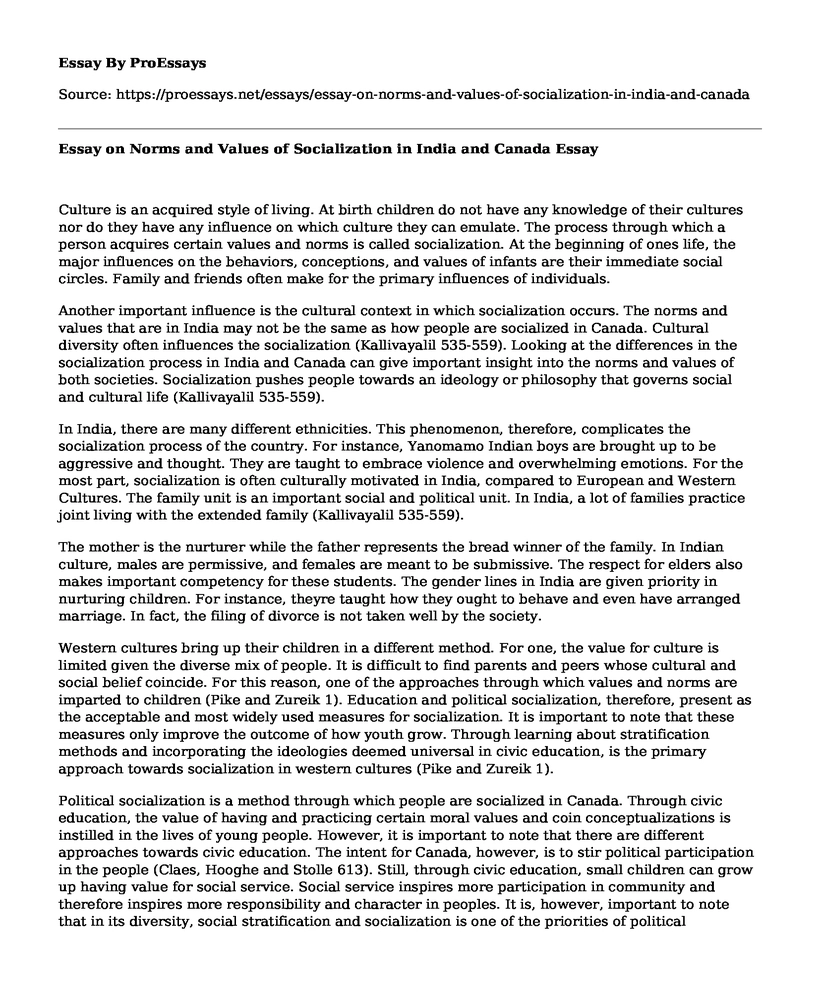Culture is an acquired style of living. At birth children do not have any knowledge of their cultures nor do they have any influence on which culture they can emulate. The process through which a person acquires certain values and norms is called socialization. At the beginning of ones life, the major influences on the behaviors, conceptions, and values of infants are their immediate social circles. Family and friends often make for the primary influences of individuals.
Another important influence is the cultural context in which socialization occurs. The norms and values that are in India may not be the same as how people are socialized in Canada. Cultural diversity often influences the socialization (Kallivayalil 535-559). Looking at the differences in the socialization process in India and Canada can give important insight into the norms and values of both societies. Socialization pushes people towards an ideology or philosophy that governs social and cultural life (Kallivayalil 535-559).
In India, there are many different ethnicities. This phenomenon, therefore, complicates the socialization process of the country. For instance, Yanomamo Indian boys are brought up to be aggressive and thought. They are taught to embrace violence and overwhelming emotions. For the most part, socialization is often culturally motivated in India, compared to European and Western Cultures. The family unit is an important social and political unit. In India, a lot of families practice joint living with the extended family (Kallivayalil 535-559).
The mother is the nurturer while the father represents the bread winner of the family. In Indian culture, males are permissive, and females are meant to be submissive. The respect for elders also makes important competency for these students. The gender lines in India are given priority in nurturing children. For instance, theyre taught how they ought to behave and even have arranged marriage. In fact, the filing of divorce is not taken well by the society.
Western cultures bring up their children in a different method. For one, the value for culture is limited given the diverse mix of people. It is difficult to find parents and peers whose cultural and social belief coincide. For this reason, one of the approaches through which values and norms are imparted to children (Pike and Zureik 1). Education and political socialization, therefore, present as the acceptable and most widely used measures for socialization. It is important to note that these measures only improve the outcome of how youth grow. Through learning about stratification methods and incorporating the ideologies deemed universal in civic education, is the primary approach towards socialization in western cultures (Pike and Zureik 1).
Political socialization is a method through which people are socialized in Canada. Through civic education, the value of having and practicing certain moral values and coin conceptualizations is instilled in the lives of young people. However, it is important to note that there are different approaches towards civic education. The intent for Canada, however, is to stir political participation in the people (Claes, Hooghe and Stolle 613). Still, through civic education, small children can grow up having value for social service. Social service inspires more participation in community and therefore inspires more responsibility and character in peoples. It is, however, important to note that in its diversity, social stratification and socialization is one of the priorities of political socialization. The country is ultimately focused on protecting the ethnicities and the values that they hold. They country, therefore, is better positioned regarding liberal and culturally motivated socialization(Claes, Hooghe and Stolle 613).
Work Cited
Claes, Ellen, Marc Hooghe, and Dietlind Stolle. "The Political Socialization Of Adolescents In Canada: Differential Effects Of Civic Education On Visible Minorities". Canadian Journal of Political Science 42.03 (2009): 613. Web. 20 Mar. 2017.
Kallivayalil, D. "Gender And Cultural Socialization In Indian Immigrant Families In The United States". Feminism & Psychology 14.4 (2004): 535-559. Web. 20 Mar. 2017.
Pike, Robert M., and Elia Zureik. "Socialization And Values In Canadian Society: Socialization, Social Stratification And Ethnicity On JSTOR". Jstor.org. N.p., 1978. Web. 20 Mar. 2017.
Cite this page
Essay on Norms and Values of Socialization in India and Canada. (2021, Apr 21). Retrieved from https://proessays.net/essays/essay-on-norms-and-values-of-socialization-in-india-and-canada
If you are the original author of this essay and no longer wish to have it published on the ProEssays website, please click below to request its removal:
- Best Practices in Organizations
- Living on the Border Essay Example
- Analyzing an Interpersonal Situation Paper Example
- The Experience and Outcomes of Asians Americans Essay
- Article Review: Information in Communicative Planning
- The Interplay of Buddhist and Chinese Cultures: Challenges and Opportunities - Essay Sample
- Essay Sample on Dark Skin Women and Beauty Standards: Discrimination & Praise







